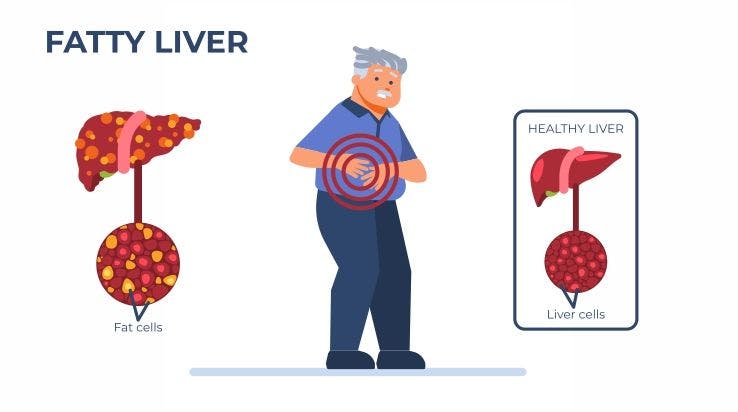Fatty Liver Disease: Causes, Symptoms, and Lifestyle Solutions
By:

Apex Hospitals
26-01-2024 5 Min Read

What is Fatty Liver Disease?
Excessive fat accumulation in the liver characterizes fatty liver, a condition prevalent among individuals with diabetes and those who are overweight. It is also known as hepatic steatosis. While it may manifest without noticeable symptoms, it poses a risk for significant health issues. Taking proactive steps to modify your lifestyle is crucial in preventing and improving this condition.
Ideally, the liver, the primary organ for processing food and waste, contains minimal or no fat. However, excess calories, whether from alcohol or food, prompt the body to convert some calories into fat. This surplus fat is then stored within liver cells.
When the fat content surpasses 5% to 10% of the liver's total weight, it results in the diagnosis of fatty liver. The prevalence of this condition is on the rise, coinciding with an increased consumption of added sugars and fats.
Types of fatty liver disease:
When excessive fat accumulates in the liver due to significant alcohol consumption, the condition is identified as alcoholic fatty liver disease (AFLD).
Conversely, in individuals who do not engage in heavy alcohol consumption, the condition is referred to as non-alcoholic fatty liver disease (NAFLD).
What are the symptoms of fatty liver disease?
Fatty liver disease often presents without noticeable symptoms. However, individuals experiencing symptoms may:
- Feel tired or generally unwell
- experience pain in the upper right part of the abdomen
- Notice weight loss.
Indicators of a potentially more severe form of fatty liver disease include:
- Yellowing of the eyes and skin (jaundice)
- Bruising
- Dark urine
- Swelling in the abdominal area
- Vomiting blood
- Black stools (poos)
- Itchy skin
We recommend consulting with our doctors for proper evaluation and guidance if you observe any of these symptoms.
Causes of fatty liver disease:
Fatty liver typically develops due to a combination of factors over an extended period. The primary causes include:
1. Obesity or Overweight, Especially Around the Abdomen:
- A significant factor contributing to fatty liver development.
2. Type 2 Diabetes Mellitus or Insulin Resistance:
- Individuals with diabetes or insulin resistance are more susceptible.
3. High Blood Cholesterol or Triglycerides:
- Elevated levels of cholesterol or triglycerides contribute to the condition.
4. Excessive Alcohol Consumption:
- Drinking too much alcohol is a common cause of fatty liver.
Less common causes include:
1. Underactive Thyroid:
- An inactive thyroid can contribute to fatty liver development.
2. Certain Medications:
- Some medications may contribute to the condition.
3. Polycystic Ovary Syndrome (PCOS):
- PCOS can be associated with the development of fatty liver.
Complications late in pregnancy can also lead to fatty liver in some cases.
There are two main types of fatty liver disease:
1. Metabolic Associated Fatty Liver Disease:
- Also known as non-alcoholic fatty liver disease (NAFLD) or non-alcoholic hepatic
steatosis.
- Caused by being overweight or obese and insufficient physical activity.
2. Alcohol-Related Fatty Liver Disease:
- Caused by prolonged and excessive alcohol consumption.
- At risk if consuming more than ten standard drinks per week or engaging in binge
drinking (having more than four standard drinks in a day).
Diagnosing Fatty Liver Disease:
To diagnose fatty liver disease, your doctor will thoroughly discuss it with you, followed by a physical examination. Additionally, you may be required to undergo a liver function test, a blood test assessing the health of your liver. Diagnostic imaging, such as an ultrasound or an MRI scan, may also be recommended.
If these initial tests indicate fatty liver, further assessments may be necessary. Depending on the results, your doctor might suggest consulting a gastroenterologist. In severe cases, a liver biopsy may be organized by a specialist to confirm the diagnosis and assess the disease’s severity.
Treatment for Fatty Liver Disease:
No specific medications are designed to treat fatty liver disease. Instead, management focuses on lifestyle changes to improve or reverse the condition.
The recommended steps for individuals with metabolic-associated fatty liver disease include:
- Adopting a healthy diet emphasising avoiding sugar.
- Weight loss if overweight.
- Regular exercise.
- Blood sugar control.
- Managing high cholesterol, if applicable.
- Avoiding medications that may impact the liver.
- Limiting or abstaining from alcohol and quitting smoking.
If alcohol is the cause of fatty liver, the primary treatment involves complete abstinence from alcohol to prevent the progression of the condition.
Prevention of Fatty Liver Disease:
Preventing metabolic-associated fatty liver disease involves following lifestyle advice similar to those already diagnosed. This includes:
- Maintaining a healthy diet rich in fruits, vegetables, whole grains, and healthy fats.
- Sustaining a healthy weight.
- Consuming little to no alcohol.
- Engaging in regular physical activity on most days of the week.
If you are not accustomed to regular exercise, it is advisable to consult with your doctor before initiating any new fitness routine.
“Ready to Take Control of Your Liver Health? Schedule a Consultation Today!
If you’re concerned about fatty liver disease, have been diagnosed, and need expert guidance, our specialized team at Apex Hospitals is here to support you. From comprehensive diagnostics to personalized treatment plans, we’re dedicated to helping you achieve optimal liver health.
FAQS
Related Articles
Connect With Us
Health In A Snap, Just One App.
KNOW MORE































































